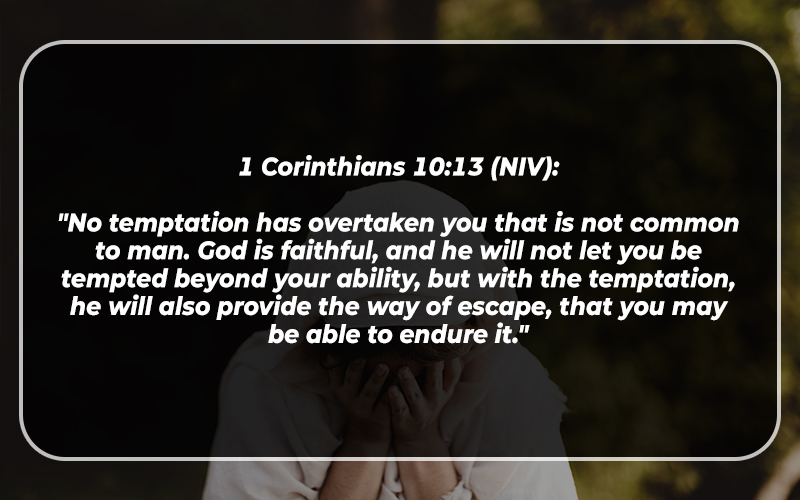Sin refers to actions, thoughts, or attitudes that violate God’s moral standards. It deviates from the perfect righteousness God requires, affecting the relationship between mankind and God Almighty.
The Bible vividly portrays sin’s pervasive influence on human nature and the need for redemption through Christ Jesus, who is our Saviour. This compilation of 25 Bible verses, accompanied by extended explanations, explores the multifaceted nature of sin as depicted in Scripture.
What Are The Bible Verses About Sin
Romans 3:23:
“For all have sinned and fall short of the glory of God.”
Paul’s declaration in Romans serves as a universal acknowledgment of human sinfulness. It underscores the collective reality that every individual, without exception, has fallen short of God’s perfect standard.
1 John 1:8:
“If we say we have no sin, we deceive ourselves, and the truth is not in us.”
John’s straightforward statement addresses the tendency to deny personal sin. Acknowledging sin is the first step toward repentance and reconciliation with God.
Romans 6:23:
“For the wages of sin is death, but the free gift of God is eternal life in Christ Jesus our Lord.”
Paul contrasts the consequences of sin with the redemptive gift offered through Christ. Sin leads to spiritual death, while God’s grace provides the antidote—eternal life through Jesus.
1 John 3:4:
“Everyone who makes a practice of sinning also practices lawlessness; sin is lawlessness.”
John defines sin as a transgression of God’s law, emphasizing its inherent rebellion against divine standards. The habitual practice of sin reflects a life characterized by lawlessness.
James 4:17:
“So whoever knows the right thing to do and fails to do it, for him it is sin.”
James broadens the definition of sin to include both actions and omissions. Knowing the right course of action and neglecting to follow through constitutes a sinful state.
Psalm 51:5:
“Behold, I was brought forth in iniquity, and in sin did my mother conceive me.”
David’s confession in Psalm 51 recognizes the pervasive nature of sin, even from the moment of conception. It emphasizes the inherited aspect of sin within the human condition.
Isaiah 59:2:
“But your iniquities have made a separation between you and your God, and your sins have hidden his face from you so that he does not hear.”
Isaiah highlights the relational consequence of sin—separation from God. Sin disrupts the intimate communion with the Creator, creating a barrier that necessitates reconciliation.
Ephesians 2:1-3:
“And you were dead in the trespasses and sins in which you once walked, following the course of this world, following the prince of the power of the air, the spirit that is now at work in the sons of disobedience—among whom we all once lived in the passions of our flesh, carrying out the desires of the body and the mind, and were by nature children of wrath, like the rest of mankind.”
Paul vividly describes the state of humanity prior to redemption. Sin, characterized by disobedience and rebellion, leads to spiritual death and aligns individuals with the fallen nature of the world.
Galatians 5:19-21:
“Now the works of the flesh are evident: sexual immorality, impurity, sensuality, idolatry, sorcery, enmity, strife, jealousy, fits of anger, rivalries, dissensions, divisions, envy, drunkenness, orgies, and things like these. I warn you, as I warned you before, that those who do such things will not inherit the kingdom of God.”
Paul provides a detailed list of sinful behaviors, emphasizing the contrast between the works of the flesh and the kingdom of God. Those who persist in such actions face the consequence of exclusion from God’s kingdom.
Romans 7:14-20:
“For we know that the law is spiritual, but I am of the flesh, sold under sin. For I do not understand my own actions. For I do not do what I want, but I do the very thing I hate.”
Paul’s candid reflection in Romans 7 exposes the internal struggle with sin. Despite the desire for righteousness, human frailty leads to actions contrary to God’s will.
Proverbs 24:9:
“The devising of folly is sin, and the scoffer is an abomination to mankind.”
Proverbs identifies not only overt transgressions as sin but also the deliberate planning of foolish and wicked schemes. The rejection of wisdom and the embrace of mockery are considered sinful.
Matthew 5:28:
“But I say to you that everyone who looks at a woman with lustful intent has already committed adultery with her in his heart.”
Jesus extends the understanding of sin beyond external actions to include the thoughts and intentions of the heart. Lustful desires, even unacted upon, are deemed sinful.
Romans 14:23:
“But whoever has doubts is condemned if he eats, because the eating is not from faith. For whatever does not proceed from faith is sin.”
Paul introduces the principle that actions devoid of faith are considered sinful. This emphasizes the importance of a trust-filled relationship with God in every aspect of life.
Hebrews 10:26:
“For if we go on sinning deliberately after receiving the knowledge of the truth, there no longer remains a sacrifice for sins.”
Hebrews issues a stern warning against persistent, deliberate sin after embracing the truth of Christ. Such continued rebellion diminishes the efficacy of Christ’s sacrifice.
1 Timothy 1:15:
“The saying is trustworthy and deserving of full acceptance, that Christ Jesus came into the world to save sinners, of whom I am the foremost.”
Paul’s acknowledgment of himself as the foremost sinner underscores the inclusive scope of Christ’s redemptive mission. Christ came to save sinners, offering hope and forgiveness.
Proverbs 28:13:
“Whoever conceals his transgressions will not prosper, but he who confesses and forsakes them will obtain mercy.”
Proverbs highlights the transformative power of confession and repentance. Concealing sin hinders prosperity, while genuine confession opens the door to God’s mercy.
1 Corinthians 10:13:
“No temptation has overtaken you that is not common to man. God is faithful, and he will not let you be tempted beyond your ability, but with the temptation, he will also provide the way of escape, that you may be able to endure it.”
Paul assures believers of God’s faithfulness in times of temptation. While everyone faces trials, God ensures that the intensity of temptation remains within manageable limits, and provides a way of escape.

Colossians 3:5:
“Put to death therefore what is earthly in you: sexual immorality, impurity, passion, evil desire, and covetousness, which is idolatry.”
Paul’s exhortation in Colossians emphasizes the need for believers to actively eliminate sinful practices from their lives. The call to “put to death” signifies a deliberate and decisive rejection of sin.
1 Peter 2:24:
“He himself bore our sins in his body on the tree, that we might die to sin and live to righteousness. By his wounds you have been healed.”
Peter highlights the redemptive work of Christ, bearing the burden of sin on the cross. The transformative power of Christ’s sacrifice enables believers to die to sin and live in righteousness.
Romans 12:2:
“Do not be conformed to this world, but be transformed by the renewal of your mind, that by testing you may discern what is the will of God, what is good and acceptable and perfect.”
Paul emphasizes the need for transformation through the renewal of the mind. Discerning and aligning with God’s will involves a departure from worldly conformity and a commitment to spiritual renewal.
1 John 2:1-2:
“My little children, I am writing these things to you so that you may not sin. But if anyone does sin, we have an advocate with the Father, Jesus Christ the righteous. He is the propitiation for our sins, and not for ours only but also for the sins of the whole world.”
John provides reassurance that believers have an advocate in Jesus Christ. Christ’s atonement extends beyond individual sins, offering redemption to the entire world.
Psalm 32:5:
“I acknowledged my sin to you, and I did not cover my iniquity; I said, ‘I will confess my transgressions to the Lord,’ and you forgave the iniquity of my sin.”
David’s personal testimony in Psalm 32 illustrates the liberating power of confession. The moment of acknowledging sin, coupled with genuine confession, leads to divine forgiveness.
1 John 5:17:
“All wrongdoing is sin, but there is sin that does not lead to death.”
John distinguishes between sins that lead to spiritual death and those that do not. This distinction underscores the varying degrees of consequence associated with different transgressions.
Luke 15:7:
“Just so, I tell you, there will be more joy in heaven over one sinner who repents than over ninety-nine righteous persons who need no repentance.”
Jesus’ parable emphasizes the profound joy in heaven over the repentance of a single sinner. It underscores God’s delight in the restoration of those who turn away from sin.
1 John 5:16:
“If anyone sees his brother committing a sin not leading to death, he shall ask, and God will give him life—to those who commit sins that do not lead to death. There is sin that leads to death; I do not say that one should pray for that.”
John introduces the concept of sins leading to death and those that do not. While intercession is encouraged for the latter, the former is distinguished by its severe consequences.
Also Read: Bible Verse For A Woman
Bible Verse For Birthday For A Woman

